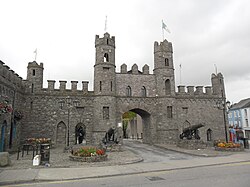
A rock festival is an open-air rock concert featuring many different performers, typically spread over two or three days and having a campsite and other amenities and forms of entertainment provided at the venue. Some festivals are singular events, while others recur annually in the same location. Occasionally, a festival will focus on a particular genre, but many attempt to bring together a diverse lineup to showcase a broad array of popular music trends.

Macroom is a market town in County Cork, Ireland, located in the valley of the River Sullane, halfway between Cork city and Killarney. Its population has grown and receded over the centuries as it went through periods of war, famine and workhouses, forced emigration and intermittent prosperity. The 2011 census gave an urban population of 3,879 people, while the 2016 census recorded 3,765 people.
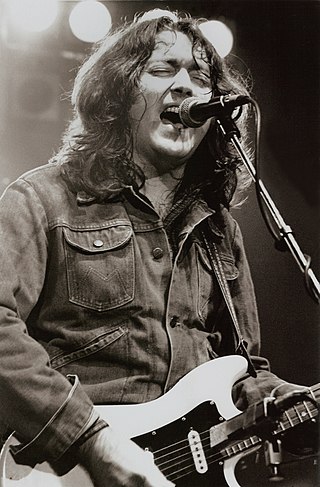
William Rory Gallagher was an Irish musician and songwriter. He is known for his virtuosic style of guitar playing, and is often referred to as "the greatest guitarist you've never heard of". A number of guitarists, including Alex Lifeson of Rush, Brian May of Queen, and Eric Clapton, have cited Gallagher as an influence. He was voted as guitarist of the year by Melody Maker magazine in 1972, and listed as the 57th greatest guitarist of all time by Rolling Stone magazine in 2015.

Irish music is music that has been created in various genres on the island of Ireland.

Taste are an Irish blues rock band formed in Cork in 1966. They were founded by songwriter and guitarist Rory Gallagher who left the band in 1970.
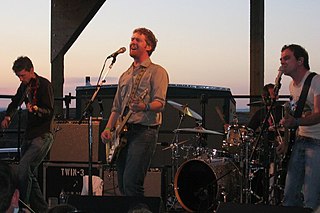
The Frames are an Irish rock band based in Dublin. Founded in 1990 by Glen Hansard, the band has been influential in the Dublin rock music scene. The group has released six studio albums. In addition to Hansard, the band's current line-up includes original member Colm Mac Con Iomaire, Dave Hingerty, Joe Doyle, and Rob Bochnik.
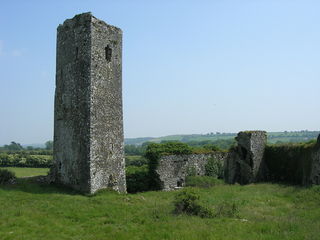
Ballincollig is a suburban town within the administrative area of Cork city in Ireland. It is located on the western side of Cork city, beside the River Lee on the R608 regional road. In 2016 it was the largest town in County Cork, at which time the Ballincollig Electoral Division had a population of 18,621 people. It is located beyond the green belt from the suburbs of Bishopstown and Wilton. Historically home to the Ballincollig Royal Gunpowder Mills which is now a Regional Park, the town has seen much growth in recent years as a satellite of Cork City. Ballincollig is within the Cork North-West Dáil constituency.

Timothy Joseph Murphy was an Irish Labour Party politician who served as Minister for Local Government from 1948 to 1949. He served as a Teachta Dála (TD) for the Cork West constituency from 1923 to 1949.
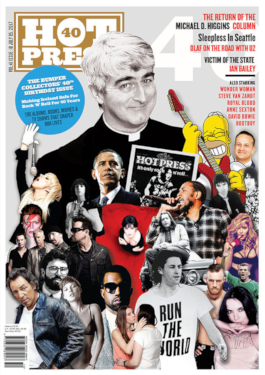
Hot Press is a monthly music and politics magazine based in Dublin, Ireland, founded in June 1977. The magazine has been edited since its inception by Niall Stokes.
Rock music in Ireland, also known as Irish rock, has been a part of the music of Ireland since the 1960s, when the British Invasion brought British blues, psychedelic rock and other styles to the island. The Irish music scene in the 1960s and much of the 1970s was dominated by the unique Irish phenomenon of the 'Showbands' which were groups of professional performers who played at dancehalls and clubs across the country putting on a professional 'show' and playing all the American and British hits of the era. From the mid-1970s onwards rock music in Ireland has followed a similar path to rock music in Britain.
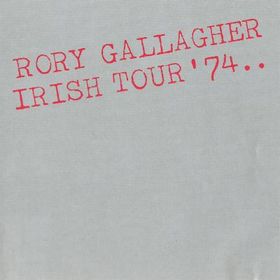
Irish Tour '74 is the sixth album by Rory Gallagher. It is a live album compiled from performances during Gallagher's Irish Tour in January 1974. The source concerts were recorded at Belfast Ulster Hall, Dublin Carlton Cinema and Cork City Hall using Ronnie Lane's Mobile Studio. "Back on My Stompin' Ground " was recorded from a jam session during the tour. Irish Tour '74 has sold in excess of two million copies worldwide. An article in a Belfast daily newspaper stated: "Rory Gallagher never forgot Northern Ireland, he returned throughout the '70s when few other artists of his calibre dared come near the place."

SFX Hall, sometimes referred to as SFX Theatre or The SFX, was a theatre located on Upper Sherrard Street, in Dublin, Ireland. The venue was named after the St Francis Xavier Hall and constructed in 1957, although a theater had been located on that site since the middle of the 19th century. The theatre served as the national concert hall, a home to the RTÉ Symphony Orchestra, and on occasion, large-scale performances. The venue had a standing capacity of 1000 and hosted pop and rock music concerts until 2001 when the shows were moved to the Ambassador Theatre. In 1982, the Irish band U2 performed three shows at the SFX in support of their album War. At one time the Dublin Theater Festival was housed at the SFX.
Féile was a music festival held in the Republic of Ireland between 1990 and 1997, originally known as The Trip to Tipp. The original venue was in Semple Stadium in Thurles, County Tipperary, hence the nicknames of "The Trip to Tipp". In 1995, it was held in Páirc Uí Chaoimh in Cork city; Féile 96 was indoors at the Point Depot in Dublin. Féile was generally a three-day festival held over the bank holiday weekend in early August. In 1996 it was in July; in 1997, it was reduced to a single day in late August.
Colman Corrigan is an Irish former Gaelic footballer, selector and manager. At club level he played with Macroom, divisional side Muskerry and at inter-county level with the Cork senior football team. Corrigan also served in a number of management roles at club and inter-county levels.

John Wilson is a Northern Irish musician. He has had a prolific career, playing drums with bands such as Them, Taste and Stud. Previously with 'The Misfits', Wilson became a member of one of the numerous line-ups of Them from September 1965 to March 1966. Alongside Van Morrison, Alan Henderson, Jim Armstrong and Ray Elliott, Wilson played on recording sessions for Them's second album Them Again. Visa restrictions meant that he had to be substituted by stand-in drummers for initial live dates abroad, due to his youth. He was replaced by Dave Harvey upon leaving Them, and went on to work with Belfast groups Derek & The Sounds and Cheese.

Irish Tour '74 is a film directed by Tony Palmer. It documents Rory Gallagher's tour of Ireland in 1974. Gallagher toured at a time of great political turmoil and violence. Gallagher's band at the time was Gerry McAvoy on bass guitar, Lou Martin on keyboards and Rod de'Ath on drums.
Tom Creedon was an Irish sportsperson from Macroom, County Cork. He played Gaelic football with his local club Macroom and was a member of the Cork senior inter-county team from 1975 until 1983. Creedon was predominantly a centre back but also played at right corner back and midfield on the Cork team that played in seven Munster finals. He won a National League medal with Cork in 1980. Creedon also played at inter-provincial level with Munster and was a member of the Munster teams that won the Railway Cup in 1977 and 1981.

Macroom Castle, in the centre of the town of Macroom, was once residence and fortress of the Lords of Muskerry. The castle has changed owners many times, has been besieged, burned, and rebuilt. The MacCarthys of Muskerry owned it with some interruptions from about 1353 when Muskerry was given to Dermot MacCarthy, 1st Lord of Muskerry, until 1691 when Donogh MacCarthy, 4th Earl of Clancarty lost it definitively.

Rory and The Island has had 10 top 40 songs in the Irish iTunes rock charts, with "Jimmy's Winning Matches" breaking through to the actual overall Irish top 10 in October 2012. Lead singer Rory Gallagher was the bass player and lead vocalist with Irish Indie/Pop/Punk group 'The Revs' from 2000 to 2007.
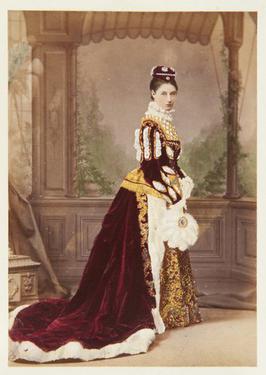
Olivia Charlotte Guinness, Baroness Ardilaun, best known as Lady Ardilaun was, after the British monarch, the richest woman of her time in Britain and Ireland. A daughter of the Earl of Bantry, she was connected to Muckross House, Macroom Castle, the St Anne's Estate in Dublin, and Ashford Castle.
